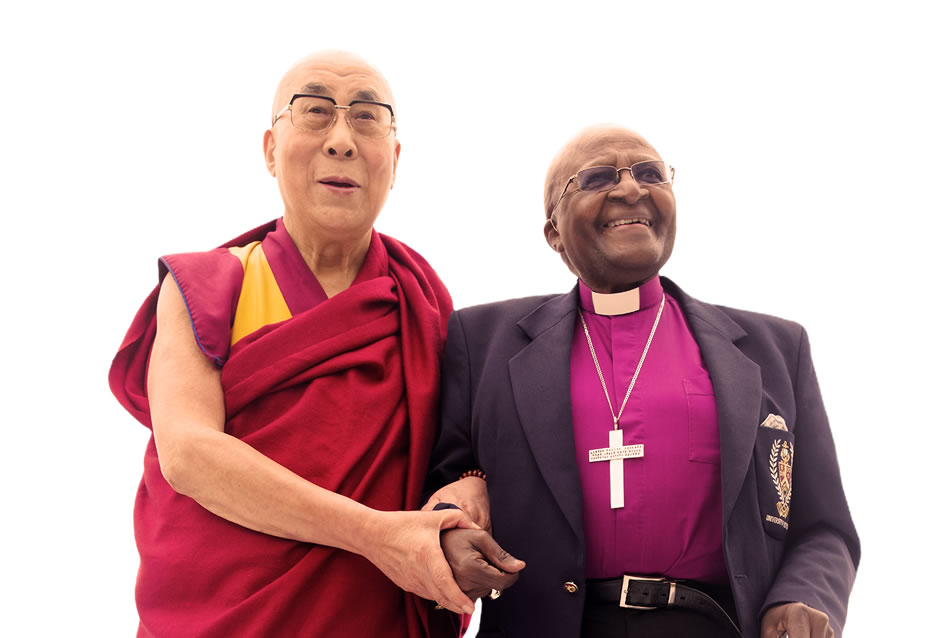- From a computer or tablet: https://zoom.us/j/410135064
- To join by phone: (312) 626-6799, then enter 410 135 064
Questions, comments? Email Fr. Chris.

By Rev. Chris Harris
This is the first in a series of blog posts are adapted from The Book of Joy by Archbishop Desmond Tutu and The Dalai Lama. Join us for our ongoing forum series on “The 8 Pillars of Joy” – Sundays at 9am on Zoom: https://zoom.us/j/410135064
“For every event in life,” says the Dali Lama, “there are many different angles. When you look at the same event from a wider perspective, your sense of worry and anxiety reduces, and you have greater joy.”
Perspective is a key foundation to lasting joy, because the way we see the world is the way we experience the world. Changing the way we see the world in turn changes our experience and thus the way we feel and the way we act — which in turn can change the world. As the Buddha says, “With our mind we create our own world.” As Christians, we know building the Kingdom of God, begins with loving our neighbor — including the stranger, the other and even our enemy. As we seek to live into that Great Commandment, changing our perspective is a great place to begin because it helps us to all as a beloved child of God. Once we can do that, our ability to love our neighbor begins to open up. For the Dalai Lama, perspective is no less than the “skull key that opens all of the locks that imprison our happiness.”
Tutu and the Dalai Lama refer to Perspective as a “quality of the mind” because while changing our emotions can be quite hard, changing our perspective is relatively easy. It is a part of our mind over which we have a great deal of influence. While we may not always have control over how we feel, we do have control over how we choose to see the world and the meaning we give to what we witness, which in turn can change how we feel.
Where to start? Intentional Self-Distancing
Because self-centeredness is our natural, default perspective, it takes intentionality to move beyond it. The practice of “Self-Distancing” is to gain a wider perspective by intentionally stepping back within our own mind, and to look at the bigger picture, moving beyond our limited self-awareness and our limited self-interest, to think more broadly about our problems or the situation. Every situation we confront in life comes from the convergence of many contributing factors. We must become skilled at seeing them. Failure to do so leaves us in a perspectival myopia, a nearsightedness that prevents us from seeing our experience in a larger context, and blind to larger truths.
Archbishop Tutu uses the example of being stuck in a traffic jam. You can deal with it in one of two ways: You can let the frustration really eat you up. Or, you can look around at the other drivers and decide to use your imagination to see their perspective. One woman might have pancreatic cancer and is on her way to the hospital. Another person might be late for work, from a job his family cannot afford him to loose. It doesn’t matter if you don’t know exactly what they are dealing with, just to know that they too are suffering with worries and fears because they too are human. Instead of wallowing in your own suffering, you can choose to lift them up and to bless them. You can say, ‘Please God, give each one of them what they need.’
Exercise:
What are some possible perspectives you might consider?
Perspective is the birthplace of empathy
By getting out of our own head and our own limited perception of the world, we can begin to see and feel what others might be going through. Self-distancing helps us to be more empathetic. When we pray that we would get that job we just applied for, for example, practicing perspective can help us see that there are undoubtedly other applicants for that same job, and we might even imagine that some of them, need the job far more than we do. What are their plights? What are their circumstances? Such a simple practice can not only reduce our own anxiety, but can increase our gratitude, and increase the compassion for others.
Empathy also opens the door to togetherness, and keeps us from building walls around our individual selves—walls that keep us from seeing the other as our brother, and from seeing Jesus in the stranger. Opening up to the lives and perspectives of others, and being willing to experience their suffering and hardships, reminds us that we, too, are not alone in our own difficulties. This sense of greater interdependence and connectedness increases our compassion by reducing our tolerance for the suffering of others. Suddenly, the suffering of a stranger is no longer “their problem,” but it is our problem because we begin to realize that my humanity is inexorably bound up in others. In the words of the Apostle Paul, “I live no longer I, but Christ lives in me.” (Galatians 2:20)
Practicing perspective doesn’t mean we no longer have problems and frustrations, but it enables us to navigate those times with greater equanimity and serenity, creativity and compassion. As Tutu reminds us, lasting joy is a byproduct of a life well-lived. By opening the doors of our perspective as wide as we can, we inadvertently open our lives to greater joy as well.
Practicing perspective (self-distancing)
If you would like to explore the practices of lasting joy, join us Sundays at 9 AM for our ongoing forum “The 8 Pillars of Joy” which will draw upon the wisdom of Archbishop Desmond Tutu and His Holiness the Dalai Lama. We will be using the best-selling book, “The Book of Joy” as our guide. Purchase the book here.
Questions, comments? Email Fr. Chris.